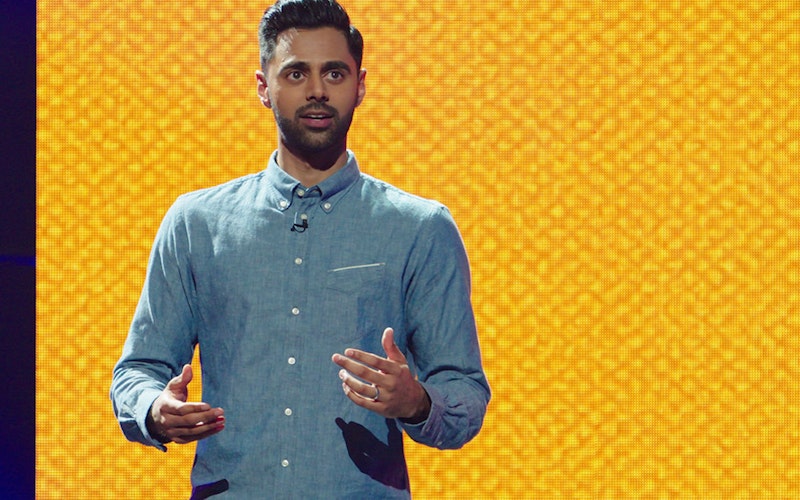
TV
A Muslim Comedian's Search for Belonging in America
Hasan Minhaj: Homecoming King—a new Netflix comedy stand-up special—is a series of stories held together by a common thread: a search for belonging while caught between two cultures.
Minhaj is the American-born child of Indian immigrants, and a comic perhaps best known for his comments at the 2017 White House Correspondents’ Dinner. He was raised by his dad for the first eight years of his life. His mother returned to India shortly after he was born to finish medical school. Upon her return to the United States, she brings a daughter, Ayesha. With touching hilarity, Minhaj recounts the unique experience of growing up with an immigrant father and finding out he has a little sister.
The adolescent Minhaj loves his family but is acutely aware of how their food, clothing, and love of Zee TV (an Indian cable channel) make them different. He’s Indian-American, but to some Americans, including neighbors in Davis, California, he will always be “other.” Minhaj longs to belong, but his dual identity leaves him without a firm footing.
Minhaj recounts the day after 9/11, when someone calls the Minhaj house and calls his dad a “sand n*****,” then busts the windows out of their family’s car. As Minhaj watches in stunned silence, his father calmly sweeps the glass from the street. He questions the fairness of having to endure these hate crimes while having his patriotism questioned because of his skin color and religion (Islam). While his dad feels that racism is the price immigrants must pay for living in America, Minhaj believes he has the same rights to life, liberty, and the pursuit of happiness as any other American.
Minhaj is of course right: he’s an American simply by nature of his birth and thus can be assured that he “belongs.” Likewise, Christians belong to God and each other simply by nature of their belonging to Christ (Rom. 8). As we are born again, we are given a secure place in heaven (1 Pet. 1:4) and within the body of Christ.
Yet we, like Minhaj, often struggle to receive and live into this truth. Minhaj recounts a saga that began in high school when he befriends Bethany Reed, a white girl who has recently moved to Davis from Nebraska. They become best friends, and she asks him to be her prom date. But when Minhaj arrives at her house on prom night, her parents tell him that they have a different plan; they are worried that there will be a lot of pictures sent to family in Nebraska, and that he isn’t “a good fit.”
Years later, Minhaj tells his dad what happened; his dad implores him to forgive Bethany. He recognizes that her parents were afraid for their daughter. As a dad, he identifies with the desire to protect one’s children from the unknown and the ridicule of those within your tribe.
Minhaj’s father tells him he must “be brave, that his courage to do what is right has to be greater than his fear of getting hurt.” Fear is always a barrier to belonging. But just one brave choice to do the right thing can lead to generational change. Minhaj learns from his father, and Bethany—who later stands up to her mom after she meets another Indian man—that love is always greater than fear.
Early on Minhaj asks his dad if there is something that unites all humans beyond race, class, color, and creed, as his father initially rejects his son’s choice to marry a Hindu woman due to centuries of hostility between Hindus and Muslims. He does not tell us how his father responds, but as Christians, we know the answer to Minhaj’s question.
In Christ, we are given a place in a new tribe by nature of our relationship with the Son of God. In Christ, there is neither Jew nor Gentile, neither slave nor free, nor is there male and female (Gal. 3:28). But we don’t always function that way; Christians create tribes and cliques too. Some are obvious, but some are subtler and are enforced with a smile.
We, too, so often allow fear to become a barrier to belonging. Older saints may fear contemporary worship; white Christians may fear adding a black pastor to the church leadership team; a wealthy suburban church may fear serving the homeless in the city. But, with just one brave choice, we can break down the walls of hostility that are so often erected in fear.
Our attempts at reconciliation—unity beyond race, class, and creed—will be painful and messy, much like Minhaj’s journey to belong in the United States. Yet, like him, we get to choose how we respond to challenges—with fear and cynicism, or with a perfect love that drives out fear (1 John 4:18).
Fear is always a barrier to belonging. But just one brave choice to do the right thing can lead to generational change.
Topics: TV, Culture At Large, Arts & Leisure, News & Politics, North America, Home & Family, Family